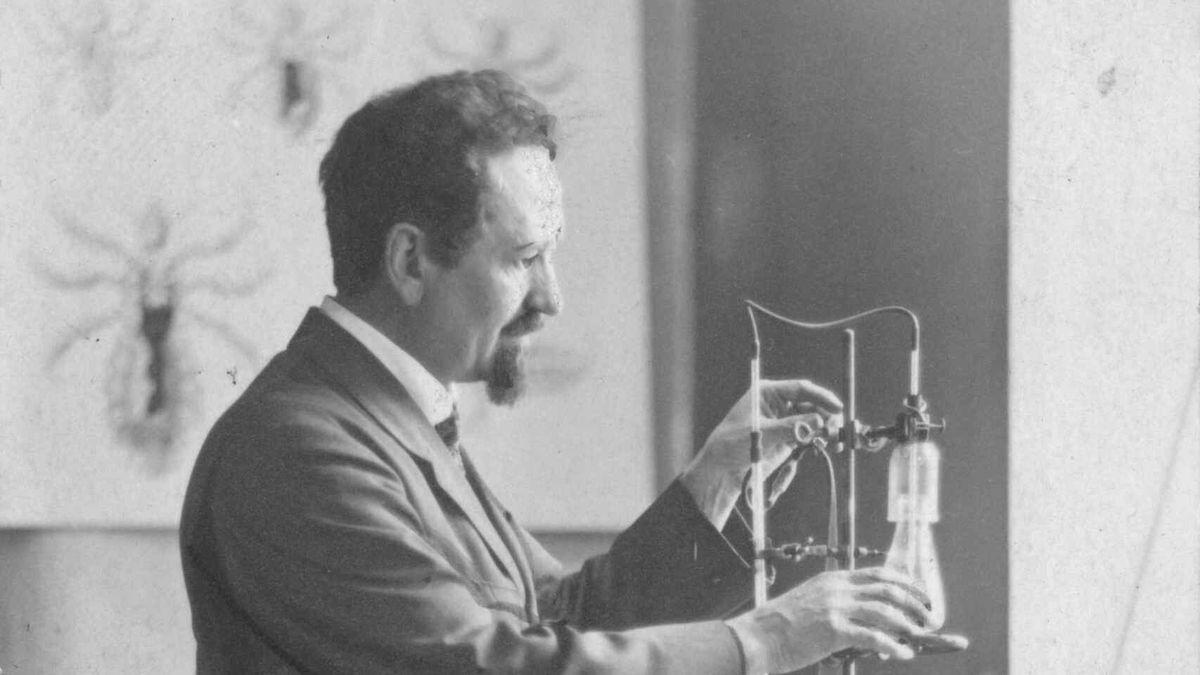Celebrity
Beyond The Laboratory: The Fascinating Life Of Rudolf Weigl
Published
6 months agoon
By
Robert King
Rudolf Weigl was a pioneering scientist and researcher whose work in microbiology and immunology helped save countless lives. Born in Austria-Hungary in 1883, Weigl would go on to develop a typhus vaccine that helped prevent the spread of the deadly disease during some of the darkest periods in European history.
But beyond his groundbreaking work in the laboratory, Weigl had a rich and fascinating life filled with adventure, creativity, and passion. In this article, we’ll explore the life and legacy of Rudolf Weigl, highlighting some of the most interesting and important aspects of his incredible journey.
Rudolf Weigl: Early Life and Education
Weigl was born in the small town of Prerau, located in what is now the Czech Republic. His father was a successful businessman, and Weigl grew up in a comfortable and relatively privileged environment. From an early age, he showed a keen interest in science and medicine, and he excelled in his studies.
After completing his primary and secondary education, Weigl went on to study at the University of Vienna, one of the most prestigious universities in Europe at the time. He earned his doctorate in medicine in 1907, and he quickly began to make a name for himself in the field of microbiology.
Research and Discoveries
Weigl’s research focused primarily on the study of microbes and how they interact with the human body. He was particularly interested in the role that bacteria played in the spread of disease, and he spent many years studying the mechanisms of various infections.
One of Weigl’s most significant discoveries was his development of a method for growing lice in the laboratory. This breakthrough was crucial because lice are the primary vector for typhus, a deadly disease that ravaged Europe during the early 20th century.
Using his new method, Weigl was able to study the lifecycle of the lice and gain a deeper understanding of how they transmitted typhus. He also used this knowledge to develop a vaccine against the disease, which was highly effective and saved countless lives during some of the most trying times in European history.
The Typhus Epidemic and Vaccine
During World War I, typhus became a major problem on the Eastern Front, with soldiers and civilians alike falling victim to the disease. Weigl was called upon to help develop a vaccine that could prevent the spread of typhus, and he rose to the challenge with characteristic brilliance.
Using his innovative methods for growing lice and studying their biology, Weigl developed a highly effective vaccine that was deployed throughout the region. The vaccine helped to significantly reduce the spread of typhus and saved countless lives.
Weigl’s work on the vaccine continued even after the war ended, and he continued to refine and improve upon his methods. By the time World War II broke out, Weigl’s vaccine was in widespread use across Europe, and it had helped to prevent the spread of typhus in some of the most challenging and dangerous environments imaginable.
Post-War Career and Political Turmoil
After World War I, Rudolf Weigl returned to Poland and established his own laboratory in Lwów (now Lviv, Ukraine). However, the political situation in Poland was unstable, with frequent changes in government and ongoing conflict with neighbouring countries. Weigl faced numerous challenges during this time, including difficulty obtaining funding and supplies for his research.
Despite these obstacles, Weigl continued to make significant contributions to the field of microbiology, including the development of a vaccine for epidemic typhus. Weigl also collaborated with fellow scientist Janusz Meissner to develop new vaccines for diseases such as spotted fever and brucellosis. Weigl’s perseverance and dedication to his work during this tumultuous period in Poland’s history are a testament to his character and commitment to scientific progress.
Weigl’s Scientific Contributions
Rudolf Weigl was a pathfinder in the field of microbiology and immunology, known for his radical work on developing vaccines for infectious diseases. His most significant contribution was the development of a vaccine for typhus fever, which saved countless lives during the typhus epidemics that wiped out Eastern Europe in the early 20th century.
Weigl’s innovative techniques for studying viruses and bacteria, including his use of live tissue cultures and the creation of an insectarium for studying lice, were also important contributions to the field. Weigl’s research and discoveries paved the way for further advancements in microbiology and immunology and continue to impact public health today.
Beyond the Laboratory: Weigl’s Personal Life and Legacy
Although Weigl is perhaps best known for his progressive work in the laboratory, he had a rich and fascinating personal life as well. He was an avid painter and photographer, and he had a deep appreciation for art and culture. He was also a loving husband and father, and he maintained close relationships with his family and friends throughout his life.
After the war, Weigl continued to work in the field of microbiology, and he remained committed to advancing the cause of science and medicine. He received numerous awards and honors for his work, including the prestigious Lasker-DeBakey Clinical Medical Research Award in 1951.
However, Weigl’s legacy was not without controversy. During World War II, he was caught up in the Nazi occupation of Poland, where he lived and worked. Although he was not a supporter of the Nazis, he was forced to work with them to continue his research.
Some have criticized Weigl for his cooperation with the Nazi regime, and others have questioned the ethics of his work more broadly. However, it is important to remember the context in which he was operating. Weigl was faced with impossible choices, and he did what he could to continue his research and help prevent the spread of disease.
Despite the controversies surrounding his work, there is no denying the immense impact Rudolf Weigl had on microbiology and immunology. His innovative research helped to save countless lives, and his legacy continues to influence the work of scientists and researchers around the world.
Bottom Line
Rudolf Weigl was a true explorer in the field of microbiology and immunology, and his life and work continue to inspire us today. Beyond his groundbreaking research and discoveries, Weigl had a rich and fascinating personal life, filled with creativity, passion, and a deep commitment to helping others.
Although his legacy has been somewhat tarnished by his association with the Nazi regime, we should remember Weigl for the immense contributions he made to science and medicine, and for his unwavering commitment to improving the human condition. In a world that often seems dark and uncertain, Weigl’s life serves as a reminder of the power of human ingenuity and the importance of scientific inquiry.
Recent News


4 Amazing Trips for Your Family
Choosing somewhere for a family vacation that would pique the attention of adults and kids alike can be a fun...


Customising Your Makeup with Blendable Blush Options
In cosmetics, one’s face is a canvas for self-expression and creativity. Among the myriad of products available, blush is a...


The Benefits of Regular Home Maintenance
Regular home maintenance is essential for maintaining and even raising the value of your house. A proactive approach to repairs...


Understanding the Importance of SEO in Adelaide
In the digital marketplace, Adelaide businesses are in a continuous contest to gain the attention of their target audiences. With...


Breaking Down the Numbers: Understanding the Average Traveling Nurses Pay
The open road, adventure, and the chance to heal – travel nursing promises an undeniable allure. But amidst the excitement,...


Dealing with Oily Skin in Summer: Tips and Tricks
As the temperature rises, those with oily skin often face an additional challenge—maintaining a clear and balanced complexion. Excess oil...


Mountain Wedding Ideas for 2024
A mountain wedding is a stunning choice for couples who cherish nature and desire a distinctive wedding experience. Whether you...


3 Of The Best Ways To Keep Your Salon Clean
It is of the utmost importance to ensure that a salon is kept scrupulously clean, not just for the sake...


3 Reasons You Should Get Blood Tests Every Year
Regular blood tests are essential for preserving general health and identifying potential problems early on. Medical professionals can evaluate your...


How to Make Your Next Crafts Project Pop
Crafting is a creative outlet that allows individuals to express themselves through various mediums such as paper crafts, sewing, painting,...
